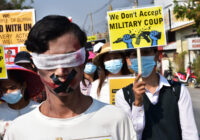The Rohingya refugee crisis has become a test for Malaysia’s foreign policy commitment to ASEAN.
The Rohingya refugee crisis presents a test of Malaysia’s chairmanship of the Association of Southeast Asian Nations (ASEAN). The most recent agreement by Malaysia and Indonesia to provide temporary shelter for the refugees, following an emergency meeting on May 20 in Kuala Lumpur, was a diplomatic breakthrough. It reflected Malaysia’s delicate efforts to maintain its regional commitment to ASEAN while allaying domestic concerns about illegal immigrants in Malaysia.
In May, Malaysia, Indonesia and Thailand turned away ships carrying mostly Muslim Rohingya refugees, who were fleeing from Myanmar due to religious and ethnic persecutions in the Rakhine state. Estimates at that point of time showed that approximately 6,000 people were stranded in the open seas. Indeed, the plight of the Rohingya people stranded in Malaysian seas drew an international outcry. The United Nations’ human rights chief, Zeid Ra’ad al-Hussein, criticized Malaysia, Indonesia and Thailand for turning away the vessels, while the European Union urged Myanmar to end the persecution of its Rohingya minority.
Initially, Malaysia had rejected the additional influx of the Rohingya boat people because an unrestricted acceptance of these refugees is not a viable, long-term solution to the crisis that was largely caused by a domestic problem within Myanmar.
Malaysia is not a signatory to the 1951 Refugee Convention, and it does not possess a legislative and administrative framework to address refugee matters. Therefore, the inclusion of more Rohingya refugees would have further strained country’s domestic capacity to cope with illegal immigrants in the country.
Nevertheless, these issues do not deny Malaysia’s long-standing concern for the plight of the Rohingya people. In 1992, the government of then-Prime Minister Mahathir Mohamad had urged Myanmar to take immediate steps to resolve the Rohingya problem. This was consistent with Mahathir’s foreign policy to project Malaysia as an Islamic nation concerned for the welfare of Muslim minorities. However, Malaysia could not interfere directly in the domestic affairs of Myanmar, given the ASEAN principle of non-interference in the internal affairs of other member-states.
Refugee Policy under Najib
Although Prime Minister Najib Razak has largely avoided the strong Islamic zeal of Mahathir’s foreign policy, Malaysia continues to be sympathetic to the Rohingya refugees. Notwithstanding the initial resistance to accept more Rohingya refugees, Malaysia has, on the whole, exhibited credible leadership as ASEAN chair by being subsequently assertive in its response to the Rohingya crisis. At the recent 26th ASEAN Summit, Malaysian Foreign Minister Anifah Aman expressed the need for the Myanmar government to resolve the Rohingya problem domestically as a long-term solution.
Malaysia and Indonesia have agreed to provide temporary shelter for the refugees in their respective countries for up to a year, after which the international community should assist to repatriate and resettle the refugee to a third country.
Indeed, if the humanitarian crisis had not been temporarily mitigated, the consequences could have been worrisome not only for Malaysia, but also for the Rohingya refugees and ASEAN. An obvious outcome would be the continued suffering of the Rohingya people. Malaysia could also be perceived as lacking leadership as chair of ASEAN. In addition, the failure to tackle the refugee crisis could have cast skepticism on the credibility of the ASEAN community if it could not provide a viable solution to alleviate the suffering of the Rohingya people.
The Rohingya refugee crisis also poses domestic challenges for Malaysia. On one hand, the growing presence of Rohingya refugees could worsen the social, economic and political problems associated with illegal immigrants in Malaysia. The Home Affairs Ministry has indicated that health and security problems could arise as a result.
In June 2013, ethnic violence between Buddhist and Rohingya Muslims in Myanmar spilled over into Malaysia, resulting in clashes between Buddhist and Muslim Myanmar nationals working in Malaysia in Selayang and the Klang Valley. These incidents threatened the safety of Malaysian citizens. Thus, a wholesale acceptance of the Rohingya refugees without addressing potential domestic problems is a risky political move that could easily trigger a backlash from the general public.
On the other hand, several members of parliament from both the ruling coalition and the opposition, as well as local nongovernmental organizations, have criticized the government for not doing enough to alleviate the suffering of the Rohingya people.
Hence, the temporary acceptance of the refugees by providing shelter for one year—subject to an international solution to the Rohingya refugee crisis—is stop-gap measure that enables Malaysia to preserve its credibility as ASEAN chair. This also placates domestic pressure to help the Rohingya refugees and, at the same time, reduce the negative impact of the presence of Rohingya migrants.
Rohingya Are ASEAN Citizens
In the end, opening borders indefinitely to the Rohingya people would not improve the domestic situation in Myanmar. In fact, it may the send the wrong signal to Myanmar that diverting its internal problem to other countries is an acceptable solution. Instead, Malaysia, Indonesia and Thailand are sending a strong message to Myanmar that pushing responsibility to others is contrary to the ideals of the ASEAN community.
Indeed, a long-lasting solution must come from an internal change within Myanmar, supported by a more inclusive ASEAN community that develops conducive measures to tackle the Rohingya problem. The Rohingya people are part of Southeast Asia, and a people-centric ASEAN community should live up to its promise of a regional body that cares for the welfare of its citizens.
*[This article was originally published by Fair Observer’s content partner, the S. Rajaratnam School of International Studies.]
The views expressed in this article are the author’s own and do not necessarily reflect Fair Observer’s editorial policy.
Photo Credit: Firdaus Latif
 We bring you perspectives from around the world. Help us to inform and educate. Your donation is tax-deductible. Join over 400 people to become a donor or you could choose to be a sponsor.
We bring you perspectives from around the world. Help us to inform and educate. Your donation is tax-deductible. Join over 400 people to become a donor or you could choose to be a sponsor.
Support Fair Observer
We rely on your support for our independence, diversity and quality.
For more than 10 years, Fair Observer has been free, fair and independent. No billionaire owns us, no advertisers control us. We are a reader-supported nonprofit. Unlike many other publications, we keep our content free for readers regardless of where they live or whether they can afford to pay. We have no paywalls and no ads.
In the post-truth era of fake news, echo chambers and filter bubbles, we publish a plurality of perspectives from around the world. Anyone can publish with us, but everyone goes through a rigorous editorial process. So, you get fact-checked, well-reasoned content instead of noise.
We publish 2,500+ voices from 90+ countries. We also conduct education and training programs
on subjects ranging from digital media and journalism to writing and critical thinking. This
doesn’t come cheap. Servers, editors, trainers and web developers cost
money.
Please consider supporting us on a regular basis as a recurring donor or a
sustaining member.
Will you support FO’s journalism?
We rely on your support for our independence, diversity and quality.







Comment